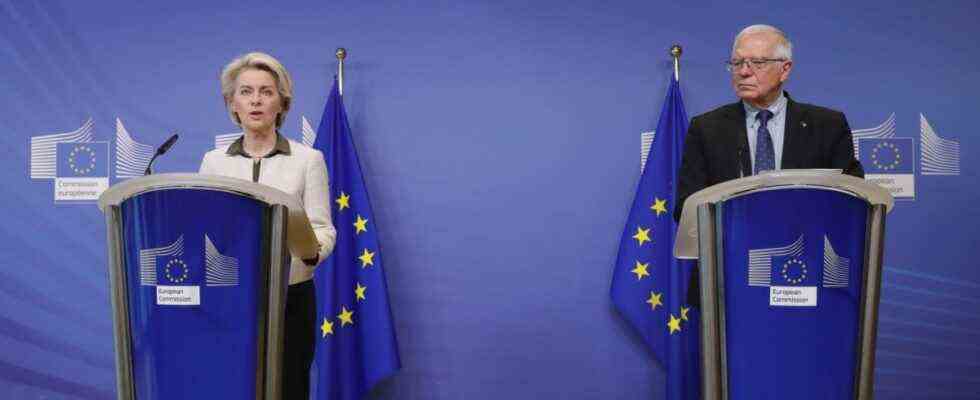European Commission President Ursula von der Leyen proposed further penalties against Vladimir Putin’s Russia and measures to support Ukraine early Sunday evening. For the first time, the European Union will finance the purchase and delivery of weapons. Von der Leyen described this as a “watershed” for the international community. At a crisis meeting in Brussels on Sunday evening, the interior ministers of the EU countries also discussed how to deal with the many refugees from Ukraine.
As for the supply of arms to the government of Ukraine, Commission officials said that 450 million euros of EU funds should be used for this. 50 million euros are earmarked for goods such as helmets, petrol or first aid material. The money comes from a program with the somewhat unfortunate name of the “European Peace Facility”. This financing instrument was created to strengthen the capabilities of armed forces in partner countries.
It is also planned to ban the “Kremlin’s media machine” in the EU
In addition, the EU foreign ministers should decide to close European airspace “for Russians,” as the CDU politician said. All aircraft registered in Russia, owned or “controlled” by Russians should not be allowed to fly over, take off or land in EU territory. Charter planes would also be affected.
Von der Leyen called the plan to ban the “Kremlin’s media machine” in the EU an “unprecedented step”. The channels and platforms Russia Today and Sputnik, which are owned by the Russian state, and their subsidiaries should no longer be able to “spread their lies” “to justify Putin’s war and sow strife in the Union,” said the commission president. According to von der Leyen, tools are being developed to ban their “poisonous and harmful disinformation” in Europe. In Germany, the TV channel Russia Today has not yet received a broadcasting license, which is why it distributes its content via the Internet.
The same, unbureaucratic procedure for taking in refugees should apply everywhere
At their crisis meeting on the same day in Brussels, the interior ministers of the EU discussed the large number of refugees expected from Ukraine. The EU Commissioner for Humanitarian Aid and Crisis Management, Slovenian Janez Lenarčič, had previously said that more than seven million people were expected to be displaced in Ukraine. As became known after the interior ministers’ consultations, the aim is to create the same, unbureaucratic procedure for taking in war refugees in all EU member states. This would mean that refugees from Ukraine do not have to go through any asylum procedures and receive temporary protection in the European Union for up to three years.
This would apply for the first time a corresponding legal basis that had been created after the Balkan wars. The directive is intended for when there are so many asylum applications that the standard procedure could overwhelm the authorities.
EU Interior Commissioner Ylva Johansson wants to officially propose the mechanism at the next regular meeting of the Interior Council on Thursday. At the meeting, at least 15 of the 27 countries with at least 65 percent of the EU population would have to agree to use the directive. Johansson said on Sunday that there was “broad support” for it. “In view of the Russian threat, Europe has moved closer together today,” said German Interior Minister Nancy Faeser (SPD).
The minimum standards that all EU countries would have to guarantee include a work permit for the displaced persons as well as access to social assistance, medical care, education for minors and, under certain conditions, the possibility of family reunification. The voluntary redistribution of refugees in the EU is also possible. So far, however, no EU country has asked for this, said Johansson, not even one directly on the border with Ukraine like Poland, which has so far taken in the most refugees from Ukraine.
Because of the Russian attack on Ukraine, according to the UN refugee agency UNHCR around 368,000 people on the run. The number is based on data from national authorities and is increasing. According to the border guards, more than 200,000 refugees have arrived in Poland alone since the start of the Ukraine war. Germany is also preparing to take in a larger number of people. The first war refugees arrived in the Federal Republic at the weekend, their number was still relatively small.

